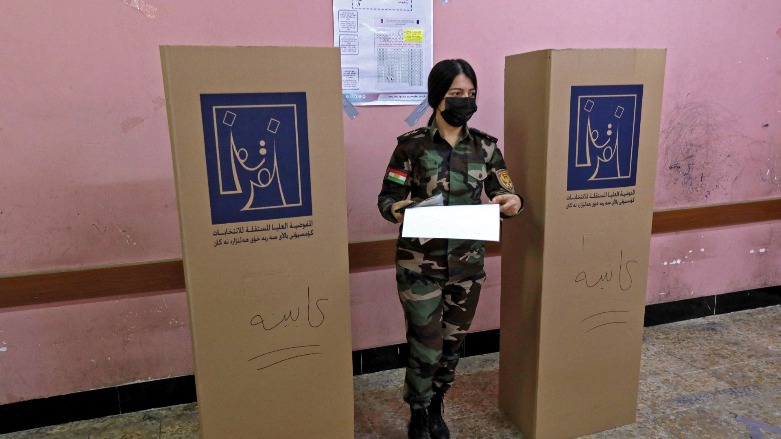Congressional report: Failure of Iraqis to vote could prompt early US withdrawal

WASHINGTON DC (Kurdistan 24) – A report from the Congressional Research Service (CRS), published last week, warned of the possible consequences, if Iraqis disillusioned with the current political system fail to vote.
Such apathy, if widespread, could lead to the dominance of the pro-Iranian factions in Iraq. But US forces are in Iraq at the invitation of the Baghdad government. If an Iraqi government tells them to leave, they will have little choice, but to leave—including from the Kurdistan Region.
The US envoy to Iraq, Amb. Matthew Tueller, explained that in clear, unequivocal terms in August in a press conference in Erbil.
Tueller was asked, “If there were [an Iraqi] demand for withdrawal, that would cover all of Iraq, including the Kurdistan Region?”
“Yes, we would have to,” the US ambassador replied.
“An election outcome and governing coalition that favors Fatah,” which is based on the pro-Iranian Shi’ite militias, “could lead Iraq’s next government to request a fuller or more prompt US withdrawal,” as the CRS report, entitled, “Iraq’s October 2021 Election,” warned.
There have been reports out of Baghdad, including from international news agencies, like AFP, that voter turnout may well “be low among the 25 million eligible voters, many of whom are deeply disillusioned and view the entire political class as inept and corrupt.”
“Many parties and activists close to the October 2019 protest movement,” which brought down the previous government of Adil Abdul Mehdi, “are boycotting the elections, denouncing the anti-democratic climate and the proliferation of weapons,” particularly among the pro-Iranian militias.
“Nearly 600 activists were killed, many thousands wounded and scores abducted in attacks that are widely blamed on pro-Iranian ‘militias,’” AFP explained.
Activists playing into hands of Iran—which wants to expel US
One can understand the frustration of those activists, but a failure to vote in Sunday’s elections will only benefit Iran, as those Iraqis who favor Iran and the Iraqis whom Tehran backs will capture that much more of the vote. Thus, they will be, accordingly, that much more dominant in Iraq’s Council of Representatives.
Indeed, the last round of Iraqi elections—in 2018—was marked by low voter turnout and record abstentions. That allowed candidates from the pro-Iranian militias, known collectively as the Hashd al-Shaabi, to enter parliament for the first time.
Isn’t there a clear lesson? Iran benefits from low voter turnout in Iraq’s elections.
One of Iran’s basic objectives in Iraq is to expel US forces. “Iran will always try to take advantage of any vacuum, any opportunity to kick the Americans out of the country,” a thoughtful Iraqi observer, based in Washington DC, told Kurdistan 24.
“If this election turns out to be another opportunity for Iran to expand its footprint in the Iraqi parliament,” Tehran will exploit that opportunity, he warned.
Don’t Take US, International Support for Granted
He cautioned his fellow Iraqis that they should not take the international support they enjoy now for granted, pointing to Afghanistan and America’s sudden departure from that country, followed, in turn, by the rest of the NATO forces stationed there.
Indeed, the international community has gone to unusual lengths to maximize the fairness and integrity of Sunday’s elections, as twelve western governments explained in a joint statement, issued on Wednesday.
Read More: Twelve countries, including US, endorse Iraqi elections; Remind Iraqis of all they have done
The statement from the Foreign Ministers of Australia, Canada, Denmark, Finland, Germany, Italy, the Netherlands, New Zealand, Norway, Sweden, the United Kingdom, and the US endorsed the preparations of Iraq’s Independent High Electoral Commission (IHEC) for Sunday’s elections, as it detailed the efforts they had made, under UN auspices.
Some 800 foreign observers are in Iraq to monitor the vote. As Jeanine Hennis-Plasschaert, Special Representative of the UN Secretary-General for Iraq, noted, “This is one of the UN's largest electro-technical assistances worldwide.”
Read More: Top UN official in Iraq: '800 foreign observers will observe Iraqi elections'
The effort, authorized by the UN Security Council last May, is being undertaken at the request of Iraqi Prime Minister Mustafa al-Kadhimi. If it results in a good turnout, the countries behind it will feel that their effort was well-rewarded. If it doesn’t, the effort is unlikely to be repeated.
“We had better get our act together,” as the Iraqi in Washington DC who spoke with Kurdistan 24, advised his fellow citizens. “Just look at Afghanistan,” he warned. “America is not always going to be there for us.”
Hopeful Signs
Despite the gloomy prognostications about voter apathy, there are some initial hopeful signs. On Friday, special voting began for the Iraqi security forces, including the Kurdish forces, as they need to be available on Sunday to provide security at the polling stations.
Read More: Iraq Election 2021: Special voting begins across country
Voter turnout in the Kurdistan Region was good, and it was hailed by the Kurdistan Region Prime Minister, Masrour Barzani.
Read More: Kurdistan Region prime minister hails security forces' early election turnout
Whether that positive turnout proves reflective of Iraq as a whole on Sunday, remains to be seen. But first reports are promising.
Late on Friday, IHEC reported that 69% of voters eligible to participate in the special voting had done so. Turnout was highest in the south and in the north: 80% in Babil Province and 76% in Maysan, as well as 80% in Sulaimani Province and 75% in Erbil.
Turnout was lowest in Anbar Province, with 59% of eligible voters participating. That may suggest that the participation of Sunni Arabs will lag behind that of Shi’ites and Kurds. If so, they will pay the price, in terms of diminished power and authority.
Still, even 59%, represents an improvement over the 2018 poll, when only 45% of eligible voters country-wide actually cast a ballot.
